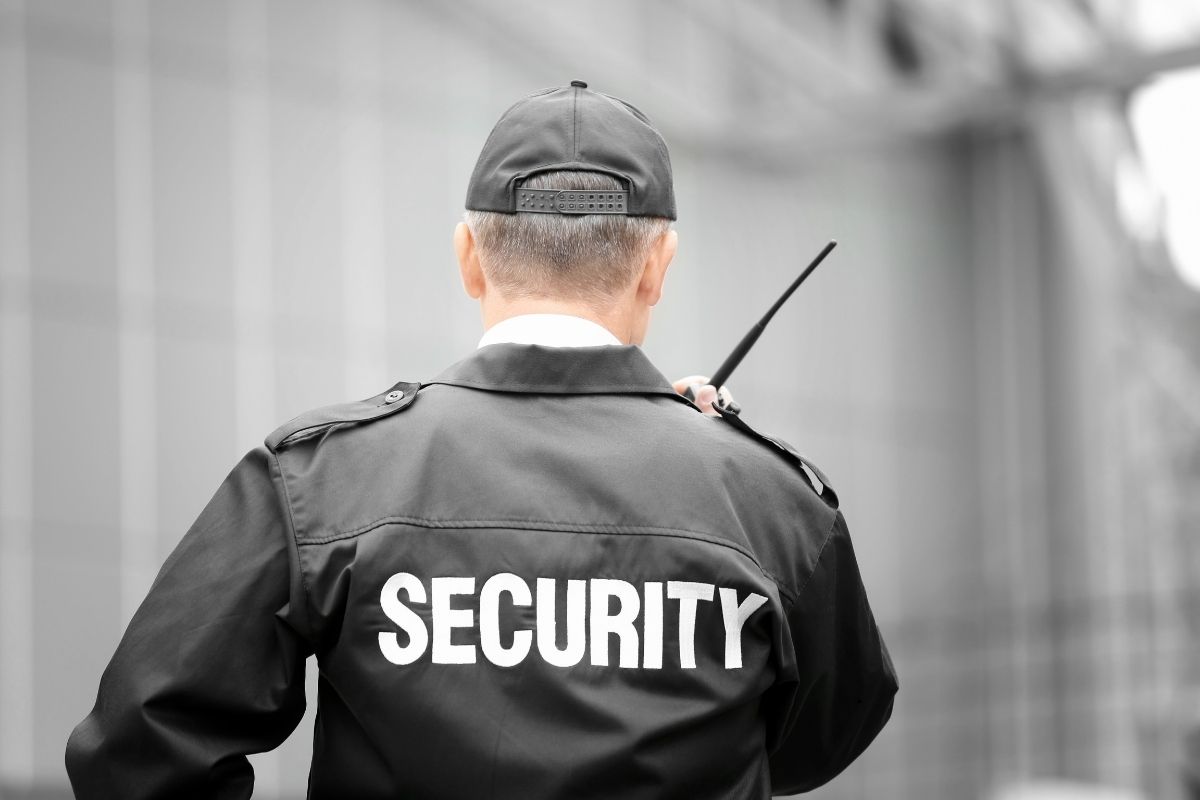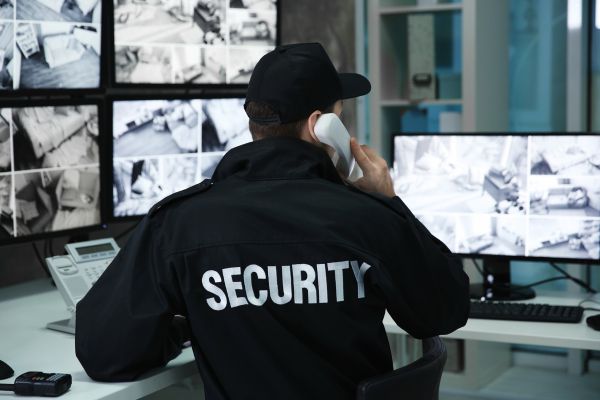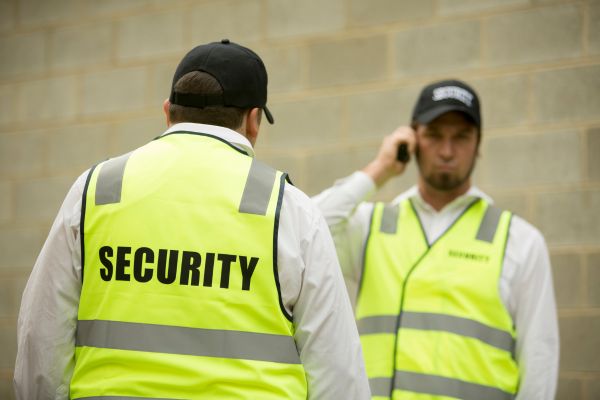
- Mon, Sep 2025
- |
- Reliable Houston Security Guard Service, Inc.
Warehouse security guards protect businesses through 8 core responsibilities: access control management, surveillance monitoring, theft prevention, emergency response, safety enforcement, incident documentation, conflict resolution, and creating workplace security confidence. These trained professionals serve as the first line of defense for facilities storing valuable inventory, using both traditional patrol methods and modern technology to prevent annual losses. Professional security services in Houston understand the unique challenges that warehouse facilities face daily.
Key functions include monitoring entry points 24/7, conducting perimeter patrols, screening visitors and employees, operating surveillance systems, responding to fires and medical emergencies, enforcing OSHA safety protocols, and maintaining detailed security logs. Professional warehouse security guards reduce theft by 75% and workplace accidents by 60% through their visible presence and active threat prevention strategies.

What Are the Main Responsibilities of Warehouse Security Guards?
Warehouse security guards handle multiple critical tasks throughout their shifts that protect business operations daily. They monitor all entry points and ensure only authorized personnel enter the facility safely. These professionals also conduct regular patrols around the warehouse perimeter and interior spaces consistently. Access control remains their primary focus as they screen visitors and employees entering restricted areas. Their comprehensive duties extend far beyond simple observation and include active threat prevention strategies similar to those used in construction site security.
Their vigilant presence helps identify potential security risks before they become serious problems affecting operations. Modern warehouse security requires guards to use advanced technology while maintaining traditional patrol methods effectively, as recommended by the American Society for Industrial Security. They coordinate with management teams about unusual activities and suspicious behavior patterns throughout facilities. Emergency response training enables them to handle various crisis situations professionally and efficiently. These security professionals serve as the foundation of comprehensive warehouse protection systems that safeguard valuable assets and maintain operational continuity.
Managing Who Gets In and Out
Controlling access stands as a top priority for warehouse security guard services in Houston today. They watch every person entering and leaving the building carefully throughout each shift. These security professionals maintain strict control over facility access points during all operating hours. Access control systems work best when trained guards monitor them consistently and effectively. Modern warehouses require sophisticated entry management to protect valuable assets and sensitive information.
- Check identification cards and keep detailed visitor records at all entry points
- Only allow people with proper authorization into sensitive warehouse areas
- Use surveillance systems to monitor all entry points effectively throughout shifts
- Screen individuals to prevent unauthorized access to inventory and expensive equipment
- Maintain visitor logs with timestamps and purpose of visit details
- Coordinate with management about suspicious individuals or unusual access requests
This careful screening prevents unauthorized individuals from accessing valuable inventory and equipment stored inside. Their vigilant approach to access control creates the first line of defense against potential security threats. Proper entry management also helps track personnel movements and maintains accountability for everyone on the premises. These guards understand that effective access control protects both physical assets and confidential business information from unauthorized exposure, following guidelines from the Security Industry Association.
Watching and Monitoring Activities
Warehouse security guards use cameras and monitoring equipment to observe all warehouse activities continuously throughout operations. They look for suspicious behavior and potential security threats throughout their daily patrol schedules. Their watchful eyes serve as a constant deterrent to criminal activity within the entire facility. Modern surveillance technology enhances their ability to detect problems before they escalate into serious incidents. Video monitoring systems provide comprehensive coverage of blind spots and remote warehouse areas, similar to systems used by shopping center security teams.
- Look for suspicious behavior and potential security threats continuously during shifts
- Conduct regular walks through warehouse areas to spot problems quickly and efficiently
- Perform both indoor and outdoor patrols for complete facility coverage daily
- Use advanced surveillance technology to enhance monitoring effectiveness significantly
- Review recorded footage to identify patterns and recurring security concerns
- Coordinate with management about unusual activities or potential safety hazards
Their constant vigilance helps catch security issues before they become major problems affecting operations. Advanced surveillance technology makes their monitoring efforts even more effective in today’s modern warehouse environments, as detailed in recent Security Today publications. Real-time monitoring allows them to respond quickly to developing situations and prevent minor issues from escalating. These security professionals understand that consistent observation protects both personnel safety and valuable company assets from various threats.
Stopping Theft Before It Happens
Preventing theft remains a critical job for warehouse security guards everywhere in today’s business environment. They watch employees, visitors, and delivery personnel to protect valuable goods from potential criminal threats. Their visible presence serves as a powerful deterrent against criminal activities within the warehouse facility. Loss prevention strategies require constant vigilance and professional security expertise to remain effective over time. These guards, whether armed or unarmed security personnel, understand that preventing theft saves companies significant money and protects their reputation.
- Watch employees, visitors, and delivery personnel to protect valuable goods constantly
- Use visible presence to discourage potential thieves from stealing expensive inventory
- Conduct regular inspections of bags and packages to catch theft attempts early
- Monitor loading docks where goods frequently move in and out during operations
- Perform random security checks on personnel and vehicles leaving the premises
- Coordinate with management about inventory discrepancies and suspicious employee behavior patterns
These guards also monitor loading docks where goods move in and out regularly throughout shifts. Their dedication significantly reduces inventory loss and protects business assets from criminal activity and unauthorized removal. Professional theft prevention requires understanding criminal behavior patterns and implementing effective countermeasures consistently, as recognized by the National Association for Shoplifting Prevention. Security guards trained in loss prevention techniques can identify potential theft situations before valuable merchandise disappears from the facility.
Handling Emergency Situations
Warehouse security guards respond quickly when emergencies occur in the facility during normal and after-hours operations. They handle fires, medical emergencies, and security breaches with specialized professional training and established protocols. Their immediate response capabilities can mean the difference between minor incidents and major disasters affecting lives. Emergency preparedness requires ongoing training and familiarity with all facility systems and evacuation procedures. These professionals serve as crucial first responders until specialized emergency services arrive on scene, much like event security services handle crowd emergencies.
- Handle fires, medical emergencies, and security breaches with professional training and expertise
- Arrive first at emergency scenes to provide immediate help and life-saving assistance
- Work closely with police, firefighters, and medical teams when serious situations require coordination
- Implement evacuation procedures safely during serious emergency situations affecting facility operations
- Maintain emergency equipment and ensure communication systems function properly at all times
- Document emergency incidents thoroughly for management review and insurance claim purposes
Evacuation procedures are implemented safely under their guidance during serious emergencies throughout the entire facility. Their quick response can prevent minor incidents from becoming major disasters that threaten lives and property. Professional emergency response training helps them remain calm under pressure and make sound decisions quickly. These security guards understand that effective emergency management protects both human lives and valuable company assets during crisis situations, following Department of Labor safety guidelines.
Ensuring Safety Rules Are Followed
Working environments in warehouses involve heavy equipment and potentially dangerous materials daily throughout all operational periods. Warehouse security guards help enforce safety protocols to prevent workplace accidents from occurring during shifts. Their safety oversight creates a protective environment for all warehouse personnel and visitors throughout operations. Safety compliance requires constant attention to detail and understanding of occupational hazard regulations and requirements. These professionals help maintain a culture of safety awareness among all facility personnel and contractors, similar to building security guard services.
- Enforce safety protocols to prevent workplace accidents from occurring during all shifts
- Conduct regular safety checks throughout all facility areas and operational zones consistently
- Report potential hazards immediately to prevent injuries from happening to personnel
- Ensure all workers follow established safety regulations under their watchful supervision daily
- Monitor compliance with personal protective equipment requirements in hazardous areas
- Coordinate with safety managers about recurring violations and improvement opportunities for protocols
All workers must follow established safety regulations under their watchful supervision throughout all operational shifts. Their safety focus creates a more secure working environment for everyone in the facility daily. Professional safety oversight helps reduce workers compensation claims and maintains regulatory compliance with government standards. These guards understand that maintaining safe working conditions protects both employee wellbeing and company liability from potential accidents and injuries, as endorsed by the Professional Security Training Network.
Writing Reports About Incidents
Warehouse security guards must document every security issue and unusual event accurately for comprehensive management review. They create detailed reports about accidents, breaches, and suspicious activities immediately after occurrence to maintain records. Proper documentation serves as crucial evidence and helps identify recurring security patterns over extended time periods. Professional reporting requires attention to detail and understanding of legal requirements for incident documentation and evidence preservation. These written records often become essential for insurance claims and legal proceedings involving facility incidents, much like documentation required for hotel security operations.
- Document every security issue and unusual event accurately for permanent facility records
- Create detailed reports about accidents, breaches, and suspicious activities immediately after occurrence
- Provide management with comprehensive reports to help improve overall security measures effectively
- Maintain proper documentation as important evidence for potential legal action and insurance claims
- Include timestamps, witness information, and photographic evidence in all incident reports thoroughly
- Follow established reporting procedures and chain of custody requirements for evidence handling
Regular reporting helps identify patterns and security weaknesses over time throughout all facility operations consistently. These records become valuable tools for enhancing warehouse protection strategies and improving overall security effectiveness. Comprehensive incident documentation helps management make informed decisions about security improvements and resource allocation for protection measures. Professional security guards understand that accurate reporting protects both company interests and provides accountability for all security-related activities and responses, as noted in InfoSecurity Magazine’s best practices.
Solving Problems Between People
Busy warehouse environments sometimes create conflicts between workers and outside visitors during daily operational activities. Warehouse security guards use special training to calm down tense situations effectively and professionally without escalating problems. Their intervention skills help maintain workplace harmony and prevent disruptions to normal operations and productivity levels. Conflict resolution requires understanding human psychology and effective communication techniques to de-escalate volatile situations successfully. These professionals serve as neutral mediators who can restore peace and maintain professional working relationships, similar to security officers in Pearland.
- Use special training to calm down tense situations effectively and professionally without force
- Handle disputes professionally to maintain peaceful workplace atmosphere consistently throughout shifts
- Provide quick intervention to prevent small disagreements from escalating into major workplace conflicts
- Help everyone feel more comfortable and secure at work daily through professional presence
- Mediate between conflicting parties to find mutually acceptable solutions to workplace disputes
- Coordinate with human resources and management about recurring interpersonal problems requiring attention
Their presence helps everyone feel more comfortable and secure at work throughout all operational shifts. Professional conflict management keeps operations running smoothly throughout busy periods and high-stress situations that arise. Effective dispute resolution protects company productivity and maintains positive working relationships among all personnel and visitors. These security guards understand that maintaining workplace harmony contributes significantly to overall operational efficiency and employee satisfaction levels.
Making Everyone Feel Safe
Having warehouse security guards visible creates confidence among workers and business customers throughout all operational activities. Employees feel more secure knowing trained professionals protect their workplace daily from various potential threats and hazards. This visible security presence demonstrates the company’s commitment to maintaining a safe working environment for everyone. Professional security guard services in Houston TX enhance company reputation and demonstrate responsibility toward employee welfare and customer safety concerns. These guards serve as visible symbols of the organization’s dedication to protecting people and property.
- Create confidence among workers and business customers through professional visible presence daily
- Help employees feel secure with trained professionals protecting workplace from threats consistently
- Build customer trust in businesses that prioritize safety and security in their operational practices
- Improve worker productivity and overall job satisfaction through security assurance and peace of mind
- Demonstrate company commitment to employee welfare and visitor safety through professional security services
- Enhance business reputation by maintaining high security standards and professional protection services
A secure environment attracts better employees and more reliable business partners over extended time periods. The investment in security pays off through improved business relationships and smoother operational efficiency throughout all activities. Professional security presence helps retain quality employees who value workplace safety and security in their employment decisions. These guards understand that their visible presence contributes significantly to overall business success and organizational reputation in the marketplace.

Common Security Challenges Warehouse Guards Face
Even the most experienced warehouse security guards encounter difficult situations that test their skills and training daily. These challenges require quick thinking, professional judgment, and adaptable security strategies to maintain facility protection. Understanding these common obstacles helps businesses appreciate the complexity of warehouse security work. Professional security requires more than simply watching entrances and walking around facilities regularly, as our team understands through years of experience.
Modern warehouse operations create unique security scenarios that demand specialized knowledge and continuous vigilance from security professionals. Criminal activities evolve constantly, forcing guards to adapt their approaches and stay ahead of new threats. Weather conditions, staffing changes, and seasonal demands add additional layers of complexity to their daily responsibilities. Technology failures and equipment malfunctions can create unexpected vulnerabilities that require immediate attention and creative solutions. These dynamic challenges make warehouse security work both demanding and essential for business protection throughout the Houston area.
High-Risk Areas and Vulnerable Points in Warehouses
Warehouse security guards must pay special attention to specific areas that attract criminal activity more frequently. Loading docks present constant security challenges due to heavy truck traffic and merchandise movement throughout shifts. These areas often have limited visibility and multiple access points that criminals can exploit easily. Inventory storage zones containing high-value products require enhanced monitoring and specialized protection strategies consistently. Emergency exits and fire doors create necessary safety access but also represent potential security vulnerabilities, similar to challenges faced by security officers in Sugar Land.
- Monitor loading docks with heavy traffic and limited visibility for suspicious activities
- Protect high-value inventory storage areas with enhanced surveillance and frequent patrols
- Secure emergency exits and fire doors while maintaining safety compliance requirements
- Watch parking areas and perimeter fencing for potential breach attempts and vandalism
- Control access to utility areas and mechanical rooms containing critical facility systems
- Inspect blind spots created by tall storage racks and equipment placement regularly
Remote warehouse sections often lack adequate lighting and camera coverage during nighttime hours. Utility rooms and mechanical areas contain valuable equipment that thieves target for copper and electronics. Perimeter fencing and gates require constant inspection for damage or tampering throughout security shifts. These vulnerable points demand creative security solutions and increased attention from warehouse security guards. Professional security assessment helps identify weakness patterns and develop comprehensive protection strategies for high-risk areas.
Seasonal Security Issues and Peak Period Challenges
Warehouse security guards face increased pressure during busy seasons when operations expand and temporary workers join. Holiday shopping periods bring higher inventory values and increased criminal attention to warehouse facilities. Summer months often see more break-in attempts due to extended daylight hours and vacation schedules. Weather-related challenges like storms can disrupt security systems and create additional vulnerabilities throughout facilities. Peak shipping seasons require guards to manage larger crowds and more complex logistics operations.
- Handle increased criminal activity during holiday seasons with higher inventory values
- Manage security for temporary workers and seasonal staff unfamiliar with facility protocols
- Address weather-related security system disruptions and power outages affecting operations
- Coordinate security during extended operating hours and weekend shifts for peak periods
- Monitor increased vehicle traffic and delivery schedules during busy shipping seasons
- Adapt patrol schedules and coverage areas based on seasonal activity patterns and risks
Staff shortages during vacation periods often leave security guards covering larger areas alone consistently. Air conditioning failures during summer can affect security equipment performance and guard comfort levels. Winter weather creates slip hazards and heating system demands that impact facility security operations. Inventory audits and cycle counts during slow periods require additional security oversight and documentation. These seasonal variations require flexible security strategies and enhanced preparation from warehouse security guards throughout the year.
Coordinating with Multiple Departments and External Partners
Warehouse security guards must work effectively with various internal departments and outside organizations during their shifts. Human resources departments require security input for employee background checks and workplace incident investigations. Operations managers need security coordination for special projects, equipment installations, and facility modifications throughout normal business. Maintenance teams require security escorts for after-hours work and access to restricted areas regularly. Information technology departments depend on security guards to protect server rooms and sensitive data storage areas through comprehensive security services.
- Coordinate with human resources for employee investigations and background check requirements
- Work with operations managers during special projects and facility modification activities
- Escort maintenance teams for after-hours work in restricted and sensitive facility areas
- Collaborate with information technology staff to protect server rooms and data storage
- Communicate with shipping departments about unusual delivery schedules and security concerns
- Interface with emergency services during drills, inspections, and actual emergency response situations
External partnerships with local police departments require ongoing communication and relationship building for effective responses. Fire departments need facility access information and emergency contact procedures updated regularly for safety compliance. Emergency medical services require clear directions and facility layout knowledge for quick response times. Insurance companies depend on security reports and documentation for claim processing and risk assessment purposes. Professional security coordination ensures all parties work together effectively to maintain comprehensive warehouse protection and operational efficiency.
Conclusion
Warehouse security guards serve as the backbone of effective facility protection through their comprehensive duties and professional expertise. Their responsibilities extend far beyond basic surveillance to include access control, theft prevention, emergency response, and safety enforcement throughout operations. These dedicated professionals handle complex challenges ranging from high-risk area monitoring to coordinating with multiple departments during peak seasons. Modern warehouse operations depend on their ability to adapt quickly to evolving threats and maintain consistent security standards.
Investing in qualified warehouse security guards provides measurable returns through reduced theft, improved safety compliance, and enhanced operational efficiency. Their visible presence creates confidence among employees and customers while protecting valuable assets from various threats daily. The combination of traditional security methods with modern technology makes these professionals essential for comprehensive warehouse protection. Smart businesses recognize that professional security services contribute significantly to long-term success and operational continuity. Contact us to learn how our warehouse security solutions can protect your business operations.
FAQs
What hours do warehouse security guards typically work?
Warehouse security guards often work various shifts including nights, weekends, and holidays to provide continuous facility protection. Many facilities require 24-hour security coverage to protect valuable inventory and maintain safety standards.
Do warehouse security guards need special training or certifications?
Most warehouse security guards need basic security training and state licensing before starting their positions. Many employers also provide specialized training for warehouse-specific challenges like emergency response and safety protocols.
Can warehouse security guards detain people for theft or trespassing?
Warehouse security guards have limited authority to detain individuals suspected of crimes until police arrive. They must follow specific legal procedures and company policies to avoid liability issues during detentions.
How do warehouse security guards communicate during emergencies?
Warehouse security guards use two-way radios, mobile phones, and alarm systems to communicate during emergencies. They coordinate directly with local emergency services and facility management to ensure quick responses.
What qualifications should businesses look for when hiring warehouse security guards?
Businesses should seek guards with proper licensing, relevant experience, and strong communication skills for warehouse environments. Background checks, physical fitness requirements, and familiarity with security technology are also important considerations.



